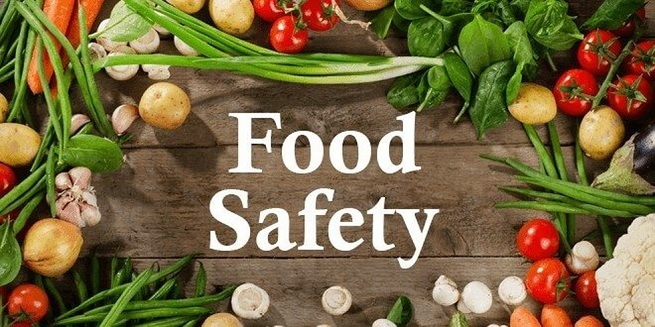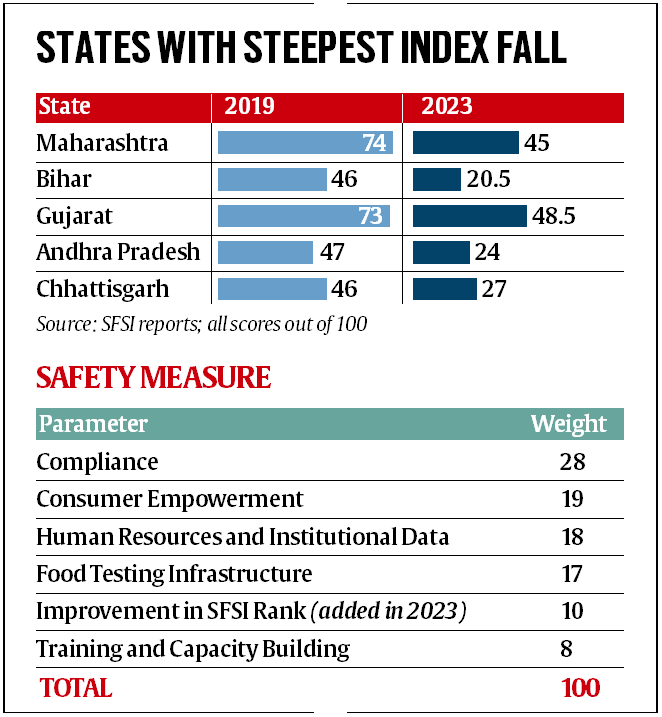





Copyright infringement not intended
Picture Courtesy: www.thehitavada.com
Context: The State Food Safety Index (SFSI) published by the Food Safety and Standards Authority of India (FSSAI) assesses the food safety standards and practices in different states of India.
State Food Safety Index
Objective of SFSI
SFSI evaluates states' performance on following parameters
|
Food Testing Infrastructure |
●Parameter Weightage (2023): 17% (20% in previous years) ●The average score for this parameter decreased from 13 out of 20 in 2019 to 7 out of 17 in 2023. ●Maharashtra, Andhra Pradesh, and Gujarat experienced significant drops in their scores, indicating a decline in the availability of adequate testing infrastructure with trained personnel for testing food samples. ●Kerala and Gujarat were the best performers in 2023, both scoring 13.5 out of 17. This suggests that while some states declined, others maintained relatively stable performance in this area. |
|
Compliance |
●Parameter Weightage (2023): 28% (30% in previous years) ●The average compliance score for all large states decreased from 16 out of 30 in 2019 to 11 out of 28 in 2023. ●States like Jharkhand, Bihar, and Gujarat experienced notable declines in compliance-related tasks such as licensing, inspections, and special drives. ●Punjab and Himachal Pradesh emerged as the top performers, showcasing the highest compliance scores in 2023. ●Bihar's compliance score dropped significantly from 20 out of 30 in 2019 to 8 out of 28 in 2023, indicating a substantial decline in compliance activities. |
|
Consumer Empowerment |
●Parameter Weightage (2023): 19% (20% in previous years) ●The average score in this parameter remained relatively stable, showing a minor increase from 7.6 out of 20 in 2019 to 8 out of 19 in 2023. ●Bihar's score dropped significantly, while Tamil Nadu emerged as the top performer with 17 out of 19, indicating a strong focus on consumer empowerment initiatives. |
|
Human Resources and Institutional Data |
●Parameter Weightage (2023): 18% (20% in previous years) ●The average score for this parameter dropped from 11 out of 20 in 2019 to 7 out of 18 in 2023, indicating a decline in the availability of human resources, including Food Safety Officers and Designated Officers. ●Even states that performed well in 2019, such as Tamil Nadu and Uttar Pradesh, experienced significant declines in their scores, highlighting challenges in maintaining a skilled workforce. |
|
Training and Capacity Building |
●Parameter Weightage (2023): 8% (10% in previous years) ●Improvement: There was a slight improvement in this parameter, with the average score increasing from 3.5 out of 10 in 2019 to 5 out of 8 in 2023. This suggests enhanced efforts in training and capacity-building initiatives. |
|
Improvement in SFSI Rank |
●Parameter Weightage (2023): 10% ●14 out of 20 large states received 0 points in this category, indicating minimal improvement in their ranks from the previous year. This suggests that most states struggled to demonstrate significant progress in comparison to their previous rankings. |

Summary
Must Read Articles:
State Food Safety Index: https://www.iasgyan.in/daily-current-affairs/state-food-safety-index-24
FSSAI: https://www.iasgyan.in/daily-current-affairs/fssai
Food Safety and Standards (Advertisements & Claims) Regulations, 2018: https://www.iasgyan.in/daily-current-affairs/food-safety-and-standards-advertisements-claims-regulations-2018
World Food Safety Day: https://www.iasgyan.in/daily-current-affairs/world-food-safety-day
|
PRACTICE QUESTION Q. What measures and regulations are in place to ensure food safety in India, and what challenges does the country face in maintaining a high standard of food safety for its diverse population? |











© 2025 iasgyan. All right reserved